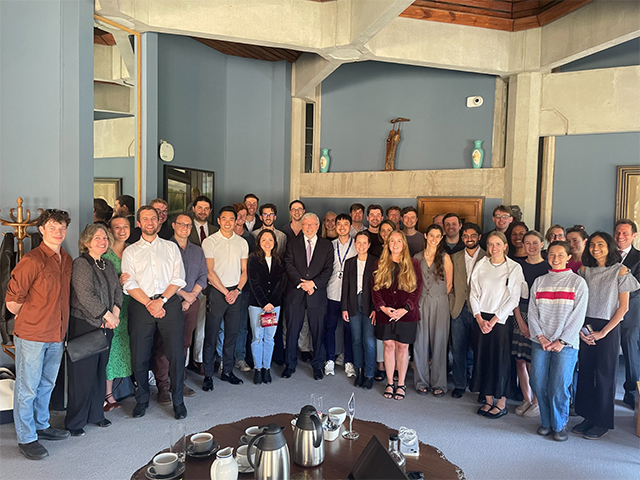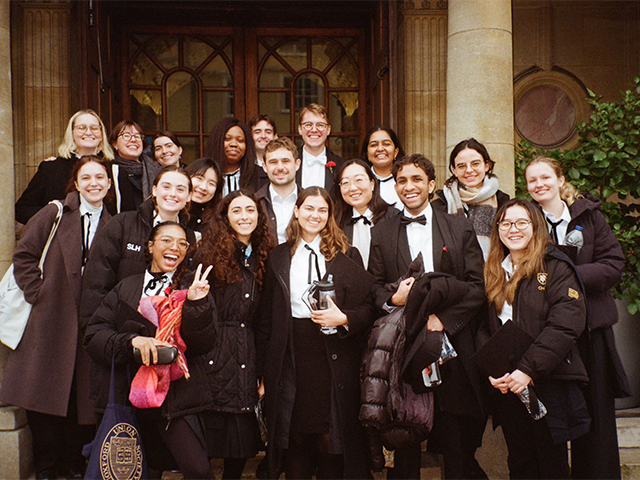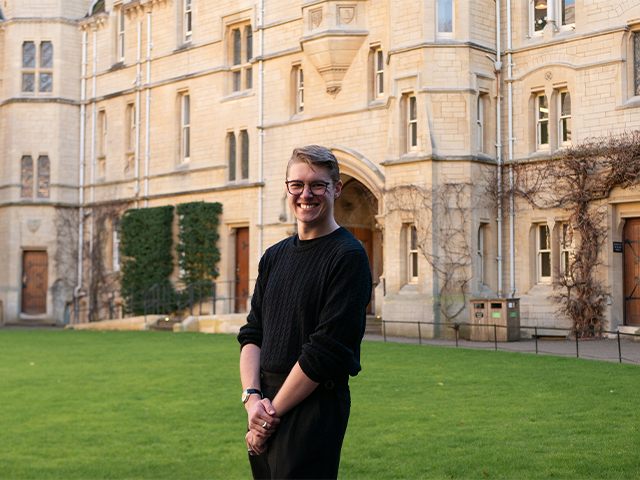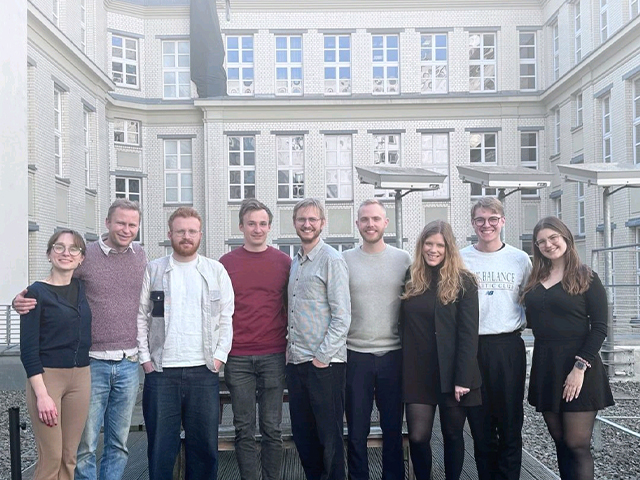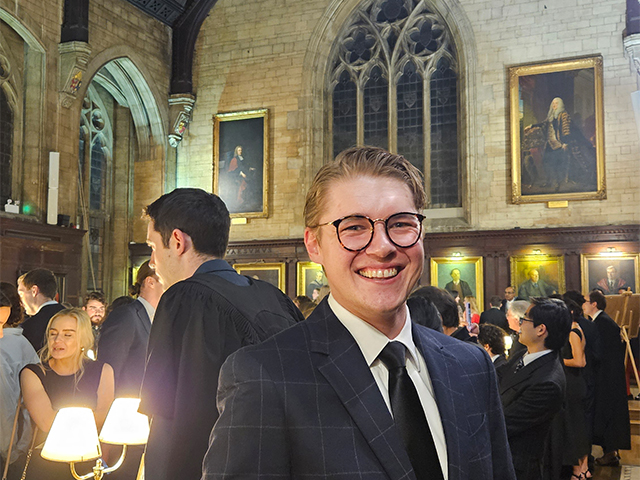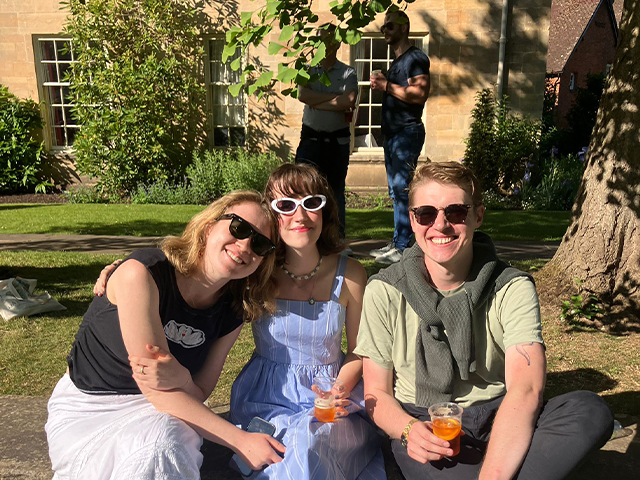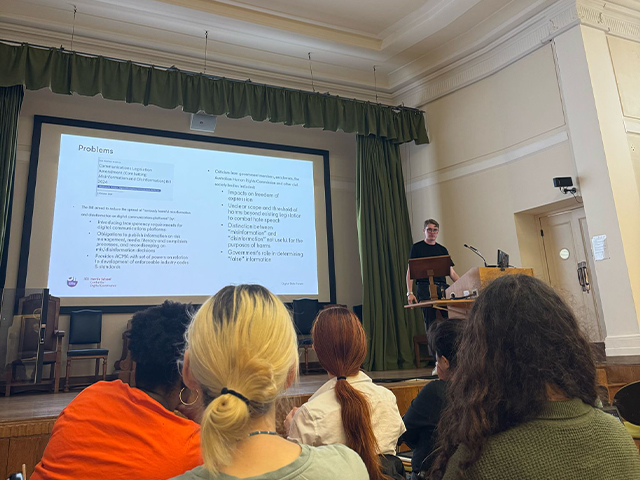Friday 06 June 2025: 2024 Ramsay Postgraduate Scholar Callum Harvey is a cyber and disinformation policy researcher and practitioner from Wollongong, NSW, focussed on the intersection of disinformation and AI.
He is currently studying a Master’s degree at the University of Oxford Internet Institute (OII), one of the first dedicated research centres for the study of the Internet in the world. Upon completion, he will progress to a doctorate, for which he will explore how governments and owners of AI models share data, tools and intelligence for the purpose of investigating cybersecurity threat actors that use AI.
Reflecting on his scholarship, Callum says it has afforded him the opportunity to be taught by some of the biggest academic names in his discipline, as well as connect with overachievers in his field. He’s joined the Digital State Forum (a research network of doctoral students from OII and the Hertie School, Berlin), met two former Australian Prime Ministers, and made great friends with Ramsay Scholars at Oxford and further afield.
Outside of his studies, Callum has kept busy as an OII Student Representative, and has even had some of his poetry published in Oxford’s student arts magazine, which he later recited at Exeter College, a self-described life highlight. But while he loves Oxford and the UK, Callum misses Australia’s beaches and coffee, and hopes to return post study to help contribute to fixing the brain drain of technology leadership from our shores.
In his own words: I am immensely grateful for the Ramsay Scholarship. The scholarship has quite simply, brought me right to the centre of my discipline by enabling my study at the OII – one of the first dedicated research centres for the study of the Internet, and the weird and wonderful things people do with it.
I’ve been in and around the technology sector in a few different guises for my whole academic and professional career; I studied media and politics at the University of Wollongong in the shadow of the post-2016 rise of disinformation in the public consciousness, then worked in cybersecurity and for the government in AI policy in Canberra. The whole time, there has been a palpable sense of bewilderment among many of my peers about the risks of social media, thinking that it’s inherently bad, and I see this hype again now with AI.
That’s simply not the case – disinformation didn’t start with the internet. Humans lie to each other. We’ve been doing it for thousands of years. We often frame this as a technological problem that can be fixed by tinkering with an algorithm. It’s not. It’s a human problem, an old problem, of epistemes clashing, albeit in a new context. Ramsay has given me scope to explore this by enabling my study at the OII, and validating the approach I took to that by grounding my study in longstanding philosophical traditions. That’s really what drew me to apply in the first place – getting scope to explore a new issue through the prism of an older tradition of scholarship.
My study at Oxford has been unlike anywhere else I’ve studied. It has a degree of mystery to it – the traditions like May Morning, where my friends and I watched the sun rise over Magdalen College as their choir sung from the belltower, or formal hall, or the fact that the university is the town and vice versa in a lot of respects. The academic experience has been intense, but more dialogic – small class sizes for a lot of my options papers, a real affirmation of the supremacy of self-directed learning in your readings, and so on. In tech in particular, it is also nice to be geographically closer to where things happen – Oxford has a very healthy tech policy and AI scene, we’re in close proximity to London, and Europe is a short flight away. In this space it’s not just what you know, it’s who you know, and Oxford brings those two threads together.
Oxford is a high-pressure environment, for sure, but the beauty of that is that I’m surrounded by lots of fascinating people whom I can learn a lot from, or indeed who have learned a lot from me based on my own experience. That’s really been the big value add – surrounding myself with a lot of well-connected anxious overachievers! There’s about 45 of us in my Master’s, and no more than about 100 at any time across the OII, so I’ve met a bunch of really talented researchers from different and diverse fields. There’s policy and intelligence types like me, tech sector folks from places like Spotify and Match Group, folks with backgrounds in non-profits and activism, and career academics. It’s amazing to bring such a diverse bunch of people together.
It’s particularly useful for me, too. I’m one of a handful of Australian folks here who aren’t from the major capital cities, and an Australian from a fairly humble background. So getting exposure to, and building some really amazing networks while making great friends and working on what I’m passionate about has been incredible.
The Oxford Internet Institute has a really diverse cast of brilliant researchers; I’ve been lucky enough to learn from a bunch of big names in my discipline, including Keegan McBride, Vicki Nash, Andy Przybylski, and Cosmina Dorobantu, my MSc supervisor. Each one of these people has a wealth of technology policy and empirical research expertise, which has been fantastic to learn about and from. I’ve also joined (as the only non-DPhil member) the Digital State Forum, a research network comprised of doctoral students from the OII and the Hertie School in Berlin, who specialise in research on government adoption of AI and other new technologies. I was invited to join based on my work before coming to Oxford with the Australian Government on AI and tech policy, and participated in a short research trip to Berlin to meet the other researchers!
My thesis is looking at disinformation policy responses and how these vary across different national contexts. I’ve also undertaken research papers looking at Elon Musk’s DOGE and digital government transformation in the US, as well as reforms to cybersecurity frameworks like DISARM and MITRE ATT&CK in the context of AI. Each of these has been fascinating, and I’m looking at fleshing each paper out into a publication.
I’ve been offered (and have accepted) a DPhil at the OII to start next year, which is looking at the sharing of data, tools and intelligence between governments and owners of AI models like OpenAI and Anthropic for the purposes of investigating cybersecurity threat actors that use AI. This is really exciting – in Australia, cybersecurity threat-sharing arrangements are kind of ad-hoc and still being formalised, but we don’t have a clear idea of what’s going on with AI. Most companies run their own threat intel teams to investigate malicious uses of their AI models and tools, but it’s not really clear at the moment how that’s shared with governments, who obviously have to consider national security while having an incomplete picture of the data.
In addition to serving as a Student Representative for the OII (where I sit on a few internal boards advising senior leadership), I’m a member of the Oxford University Jazz Society (and have played drums at a couple of their open mic nights). I’ve also joined the Oxford University Belgian Society to link up with my family’s heritage, and the Australia and New Zealand Society. As part of the latter, I attended a tour of the Australian High Commission as well as an Easter lunch with Australian students at the residence of Prof. Philip Clarke, who’s a health economics academic here. I’ve also been lucky enough to meet two former Australian Prime Ministers – Tony Abbott and Kevin Rudd, both were fascinating to listen to.
I’ve yet to be game enough to join a rowing club, but I’ve really enjoyed being a spectator of the sport. What I have done is publish some poetry– including in the Turl Magazine, a student arts magazine. I even got to read one of the pieces I wrote in the Exeter College chapel, which is one of the highlights of my time at Oxford and my life.
A joy in being here is being part of the Ramsay Scholar community; it’s very welcoming – there’s a crew of us at Oxford and at Balliol in particular from current and former year cohorts. I remember walking into the Balliol MCR my first week, seeing a lot of new faces, and then what felt like half those faces were actually Ramsay scholars!
Post study, I’d really love to return to something government-adjacent, but really the sky’s the limit after Oxford. I’ve increasingly been looking at leveraging some previous work experience in philanthropy to work in and around think tanks in tech and security. The level of tech sector knowledge and leadership in Australia is still not as mature as it could be (although this is changing with the great work from people like Jo Weaver and Zoe Hawkins at the Tech Policy Design Institute, among others). Many of Australians do have to go overseas to find opportunity, which means we really do have this brain drain in this space. Ideally, I’d like to return and fix that. Oh, and I miss the beaches and coffee.
Interested in a Ramsay Postgraduate Scholarship? Visit: https://ramsaypostgradscholarship.com/
Media contact: Sarah Switzer 0407 816 098 / sarah.switzer@ramsaycentre.org


